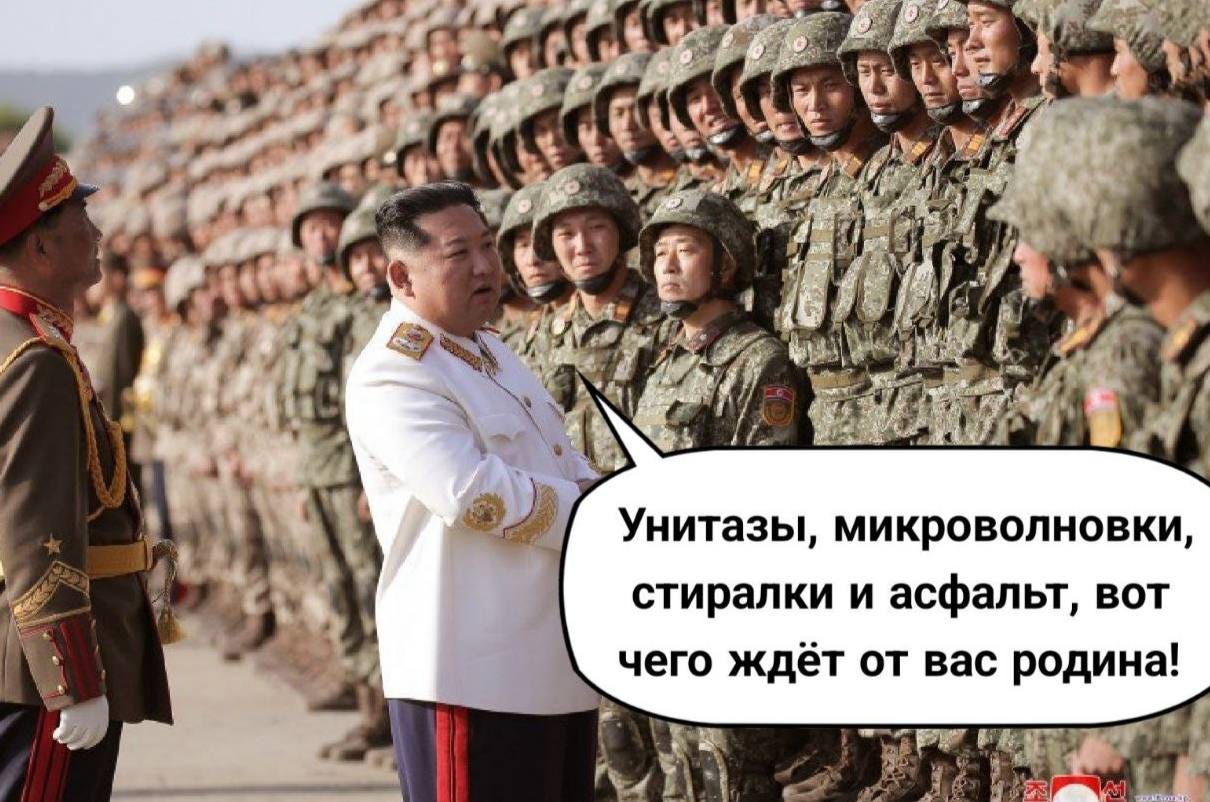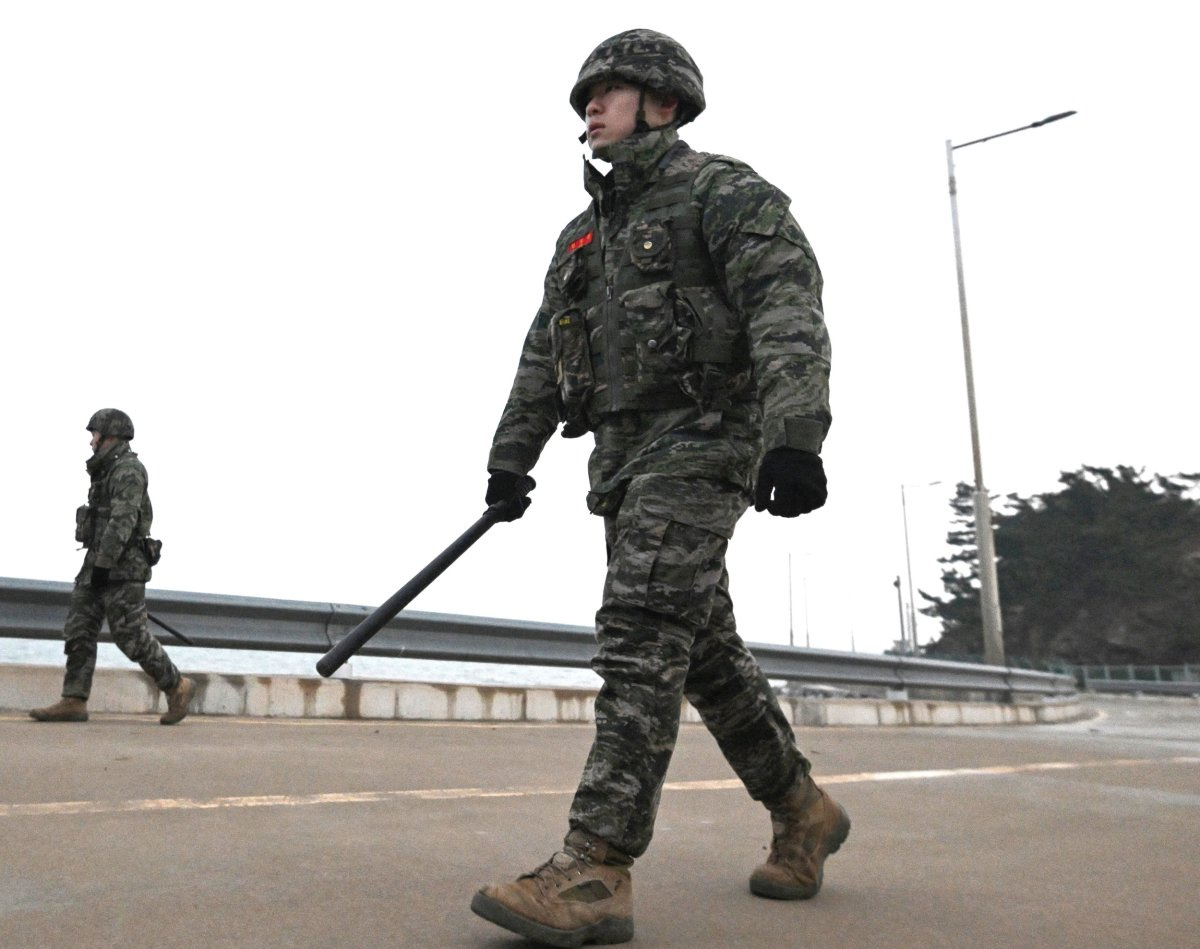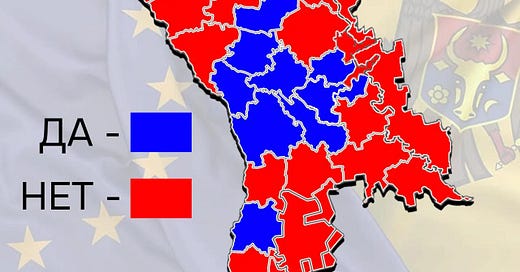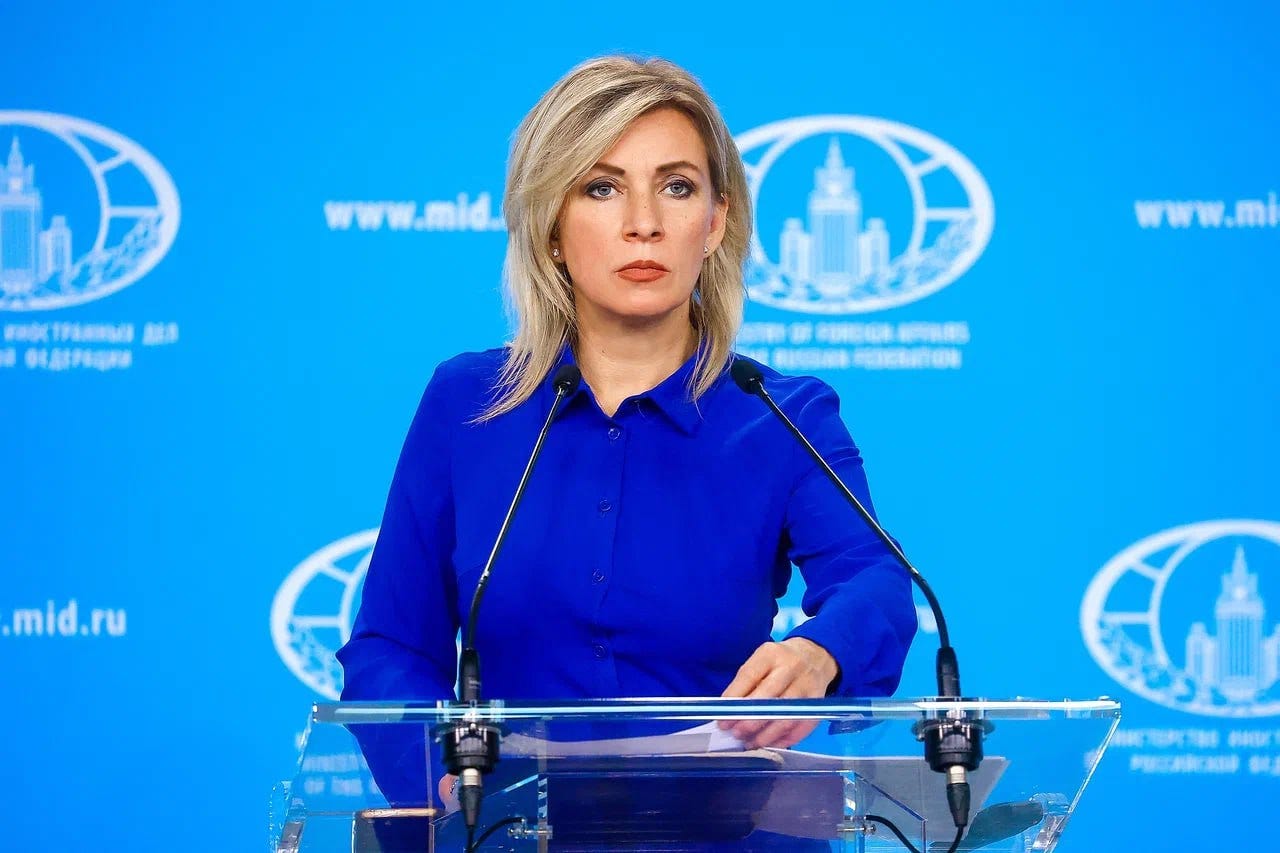Moldovans don't want the EU, but the EU imposes itself anyway
...and: Ukraine: is the [North] Korean contingent coming? + North Korea in Ukraine: what consequences?
Let’s take a break for today from the Middle East and focus on Moldavia, North Korea and and the Russo-Ukrainian war, with my English translation of three recent posts, originally in Italian, published by Nilo Vlas on his Telegram channel, plus the commentary of Maria Zakharova, the spokesperson of the Russian Ministry of Foreign Affairs, on the results of the first round of the presidential elections and the constitutional referendum in Moldova.
Here is the first post by Nilo Vals on his Telegram channel (published today, 21st October 2024 - all emphasis mine):
Moldovans don't want the EU, but the EU imposes itself anyway
In the map [shown in the picture above], in blue are marked the regions of Moldova that voted in favour of Eurointegration, in red those against.
It is therefore clear that Moldovans voted against the EU by a large majority.
So why did the “Yes” vote win anyway? What made the difference were the votes from abroad (replenished, we hypothesise, by several falsified ballot papers), which at the last moment overturned the results of the count, leading to a very slim 50.5% vs 49.5%.
Moldova has a population of between 2.5 and 3 million (depending on estimates and censuses), but there are at least half a million Moldovans living abroad (some speak of 1 million).
The two countries with the largest number of Moldovan immigrants are Russia and Italy (!) [after Romania and Ukraine, according to Wikipedia], which have 170,000 and 140,000 Moldovan citizens living on their territory respectively.
However, the distribution of polling stations abroad has been very uneven. With a similar number of Moldovan immigrants, 60 polling stations were opened in Italy and only 5 in Russia [2 actually, according to Maria Zakharova and other sources. Not sure where Nilo Vlas got this number]. Other EU countries, with a much smaller Moldovan community, nevertheless saw the opening of dozens of polling stations, in addition to the possibility of postal voting denied in Russia. Now let us ask ourselves a question: are Moldovans living in Europe or those living in Russia more pro-European? The answer is obvious.
The Moldovan electoral commission, by limiting the number of polling stations in Russia and significantly increasing those in EU countries, has done everything to push the vote in the desired direction. This is obvious even without bringing up probable but hardly provable falsifications.
Given this, it is surprising that the “Yes” vote won so narrowly, proving that the Moldovans living in Moldova do not want European integration and its harmful consequences. But others have decided for them.
Here is the English translation of the post that Maria Zakharova, the spokesperson of the Russian Foreign Ministry, published on her Telegram channel earlier today, commenting on the results of the first round of the presidential elections and the constitutional referendum in Moldova (all formatting original):
⚡️ Commentary of the official representative of the Russian Foreign Ministry M.V.Zakharova on the results of the first round of the presidential elections and the constitutional referendum in Moldova
On 20th October the first round of presidential elections and constitutional referendum on the issue of the republic's accession to the European Union took place in Moldova. The election campaign was conducted by the Moldovan authorities with anti-democratic, totalitarian methods. Being unable to compete on equal terms with political opponents, the Moldovan leadership widely used administrative resources and carried out repressions against opposition politicians and independent mass media.
This policy was justified by the need to counteract the non-existent “destructive influence of Russia”. Our country was unsubstantiatedly accused of interference in the internal affairs of Moldova and attempts to influence the will of the citizens of the republic.
❗️ The culmination of the large-scale anti-Russian campaign unleashed by Chisinau was the decision to open only two polling stations in Russia, where, according to various estimates, 300,000 to 500,000 Moldovan citizens live, under far-fetched pretexts. At the same time, about 200 polling stations were organised in the USA and Western Europe.
All this was taking place against the background of blatant interference of the West in the electoral process in Moldova. Politicians from EU member states during their numerous visits to Chisinau openly campaigned in favour of the current Moldovan leadership and its so-called European project.
International monitoring structures and observers have yet to assess the voting. At the same time, the media have already reported on numerous violations and falsifications by the authorities and facts of organised ‘transportation’ of voters to polling stations in Western European countries.
Even the observation mission of such an engaged structure as the OSCE Office for Democratic Institutions and Human Rights (ODIHR), in its interim report and preliminary conclusions, could not remain silent about the unpleasant situation in the pre-election period and during the voting.
Based on the results of the vote count at this stage, it can be concluded that the results of the vote are disappointing for the Moldovan leadership and their Western sponsors. The project of integration of the country into the European Union promoted by them did not receive unambiguous support. The majority of citizens living in the republic itself rejected it. A slight margin was ensured by the maximum mobilisation of voters living in Western Europe and North America and the unprecedented restriction of voting opportunities in Russia. The same applies to the breakdown of votes received by the incumbent head of state.
📉 The dynamics of voting in the referendum also draws attention. After 42.5 per cent of the protocols had been processed, only 44.07 per cent of voters supported the idea of joining the EU, while 55.93 per cent were against it. When 71.25% of the ballots were processed, the gap remained: 44.68% in favour and 55.32% against. Then it rapidly - and inexplicably for many in Moldova - began to shrink and after processing 99% of the protocols the result was 50.3% in favour and 49.7% against.
It is also necessary to take into account that many Moldovan citizens preferred not to participate in the referendum, thus refusing to support the discredited project of ‘European Moldova’.
Moldovans see what really hides behind the facade of the idea of Moldova's membership in the European Union and understand the true intentions of the West towards their country. Its ultimate goal is to turn the republic into a Russophobic NATO appendage deprived of sovereignty, to erase the national identity of Moldovans, their language, culture and history, to impose neoliberal values alien to Moldovan society, and to completely sever ties with Russia. The people of Moldova have said ‘no’ to this.
❗️❗️ For our part, we always respect the choice made by the Moldovans and are in favour of maintaining and developing ties with the friendly Moldovan people.

Here is the second post by Nilo Vals on his Telegram channel (published on Saturday 19th October 2024):
Ukraine: is the [North] Korean contingent coming?
The news of North Korean soldiers being sent to Russia has been persistently repeated for a couple of weeks now. Both the South Koreans and the Ukrainians are talking about it in alarmist tones, but precisely for this reason no one initially paid too much attention: the South Korean media churns out anti-North Korean fake news on a daily basis, while the Ukrainians will say anything to get more aid and perhaps get NATO more involved in the conflict. Moreover, the accusations against Pyongyang about sending its soldiers to Ukraine have been going on regularly since the summer of ‘22.
The result is that, after crying “wolf” many times, when the wolf really comes, one runs the risk of not noticing it.
In fact, it seems that this time a North Korean contingent has actually been sent to Russia, as two videos allegedly show soldiers of the Chosŏn inmin'gun (Korean People's Army) training at a military range in Russia. The videos have allegedly already been geolocated and attributed to the Vladivostok region, coincidentally the Russian region bordering [North] Korea.
Since there is no shortage of barracks in North Korea, the only reason Korean soldiers would have for training in Russia is to be deployed in the Special Military Operation.
Here is the third and final post by Nilo Vals on his Telegram channel (published on Saturday 19th October 2024):
North Korea in Ukraine: what consequences?
What consequences would a North Korean intervention in Ukraine have? Very serious, for sure. The intervention of a third party in the conflict between Russia and Ukraine would force the West to respond. It would certainly untie the hands of Kiev's allies to symmetrically replicate the Korean initiative, especially since such options had already been put on the table by Macron and other Western leaders.
The US has already declared that the entry of Korean troops into Ukraine is a “red line” not to be crossed [see image above]. And there is reason to believe they are not joking.
But there is a catch: Korean soldiers may not enter Ukraine at all.
As Zelensky himself explained, Russia could deploy Koreans to fight the Ukrainian forces that invaded the Russian Kursk region in early August. This would definitely be a game-changer, as no Kim's soldiers would cross the internationally recognised Ukrainian borders.
Russia has not declared war on Ukraine, nor vice versa: formally then, Ukrainian soldiers on Russian soil are terrorists, to fight which Moscow has every right to ask allies for help. Formally then, North Korea would be fighting undefined bandits carrying out criminal acts on the territory of the Russian Federation: this cannot be considered an act of aggression against Ukraine.
Appearances would be saved, and the West would have no pretext for escalation.
Sophisms of international law.
However, it must be said that tensions between North and South Korea are very high, with the former threatening a declaration of war against the latter in case of new incidents, after finding the remnants of a South Korean military drone on its territory, as reported in this Newsweek article; so, I would not be surprised that North Koreans are training with Russians, not to enter the fray in Ukraine or Kursk, but to prepare for a possible war against South Korea, which would mean the opening of third front for the Outlaw US Empire, after Ukraine and the Middle East. Who knows? Maybe they are preparing to open this third front to destabilize the Outlaw US Empire…








"I would not be surprised that North Koreans are training with Russians, not to enter the fray in Ukraine or Kursk, but to prepare for a possible war against South Korea"
That would be my conclusion. Russia has an enhanced military alliance with NK, since the West launched the war against Russia. Russia has supplied NK with enhanced missile systems. So it would be no surprise to me if Russia extended an invitation to NK to send its troops to Russian training grounds for training in modern Russian military tactics, Russian arms and systems. Everything NK has is old Soviet stuff (but they have a lot of it.)
If for no other reason than to poke the US in the eye for launching a proxy war against Russia...
Russia has offered similar deals with other countries. I remember reading they offered it to Lebanon in the past. Military agreements of this type are common among countries, usually for weapons sales reasons. Lebanon was offered various forms of military assistance, including preferred customer status buying Russian weapons, admission to Russian military exercises as observers, etc.
Russia has more than enough men to not need NK troops. It would be interesting if Russia made a deal with NK to supply men, not for rear duty, but actual combat troops, in exchange for economic aid to NK. But I doubt that's the case.